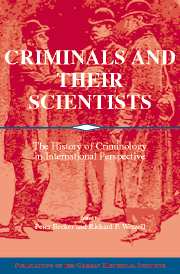Book contents
- Frontmatter
- Introduction
- Part One Nonacademic sites of Nineteenth-Century Criminological Discourse
- Part Two Criminology as Scientific and Political Practice in the Late Nineteenth and Early Twentieth Centuries
- Part Three The Making of the Criminologist
- Part Four Criminology in the First Half of the Twentieth Century: The Case of Weimar and Nazi Germany
- 18 Criminology in Weimar and Nazi Germany
- 19 The Biology of Morality: Criminal Biology in Bavaria, 1924-1933
- 20 Criminals and Their Analysts: Psychoanalytic Criminology in Weimar Germany and the First Austrian Republic
- 21 Drinking and Crime in Modern Germany
- Index
21 - Drinking and Crime in Modern Germany
Published online by Cambridge University Press: 05 January 2013
- Frontmatter
- Introduction
- Part One Nonacademic sites of Nineteenth-Century Criminological Discourse
- Part Two Criminology as Scientific and Political Practice in the Late Nineteenth and Early Twentieth Centuries
- Part Three The Making of the Criminologist
- Part Four Criminology in the First Half of the Twentieth Century: The Case of Weimar and Nazi Germany
- 18 Criminology in Weimar and Nazi Germany
- 19 The Biology of Morality: Criminal Biology in Bavaria, 1924-1933
- 20 Criminals and Their Analysts: Psychoanalytic Criminology in Weimar Germany and the First Austrian Republic
- 21 Drinking and Crime in Modern Germany
- Index
Summary
Prior to the foundation of the German Empire in 1871, drunkenness as such was not prosecuted under the law, but the consequences of it were, inasmuch as they were criminal offenses. By the middle of the century, however, German physicians, well aware of the worldwide respect that German science enjoyed, became increasingly active in public policymaking on health questions. In the 1860s, their investigations into the workings of the human brain convinced them that a person delirious with fever, drugged with sleep (drunk with sleep, schlaftrunken, in German phraseology), or drunk from alcohol might not be responsible for his or her actions. Under Prussian law only mental illness (Geisteskrankheit) could exonerate a criminal from legal responsibility; if he were declared non compos mentis, of unsound mind, there were grounds for acquittal from any crime. The Prussian doctors successfully pressed for the inclusion of the new categories in the criminal code of the North German Confederation, which was then carried over into the new Empire. The amendment was effected in broad rather than specific terms. The term mental illness was replaced with the imprecise phrase, “a pathological disturbance of mental activity” (krankhafte Störung der Geistesthätigkeit), which left open the question of precisely how drunk a person had to be in order to have himself declared not responsible for his actions. Subsequent legal practice demonstrated the welcome flexibility this provided to exonerate the upper classes while allowing punishment of the lower classes for similar offenses. Initially, however, even the latter benefited from the new legislation.
- Type
- Chapter
- Information
- Criminals and their ScientistsThe History of Criminology in International Perspective, pp. 471 - 486Publisher: Cambridge University PressPrint publication year: 2006
- 2
- Cited by



